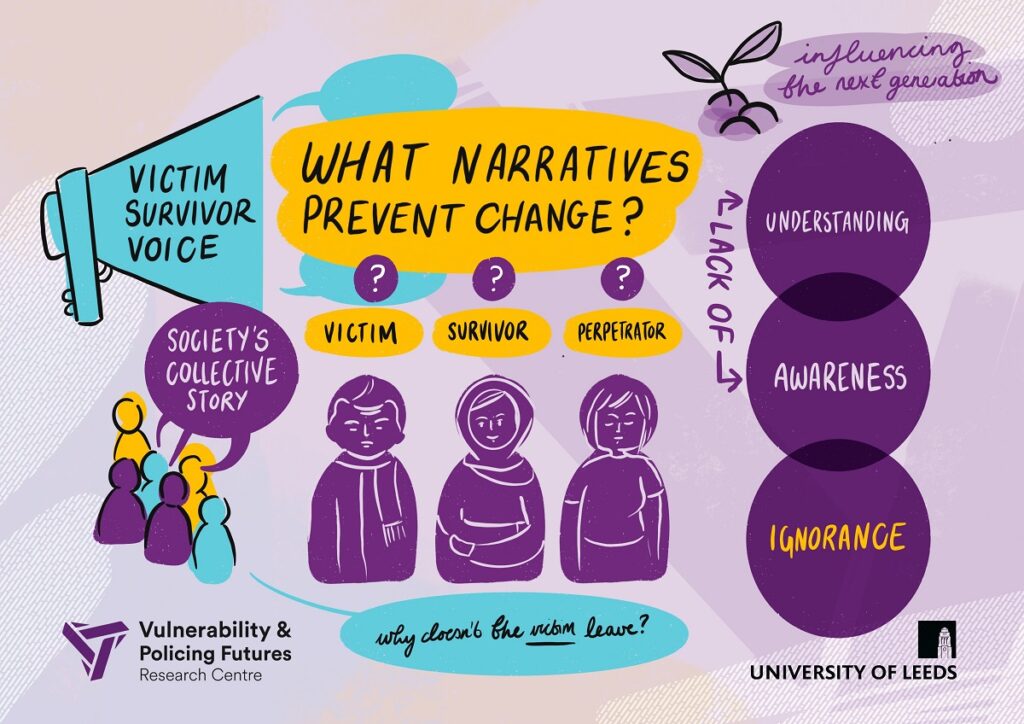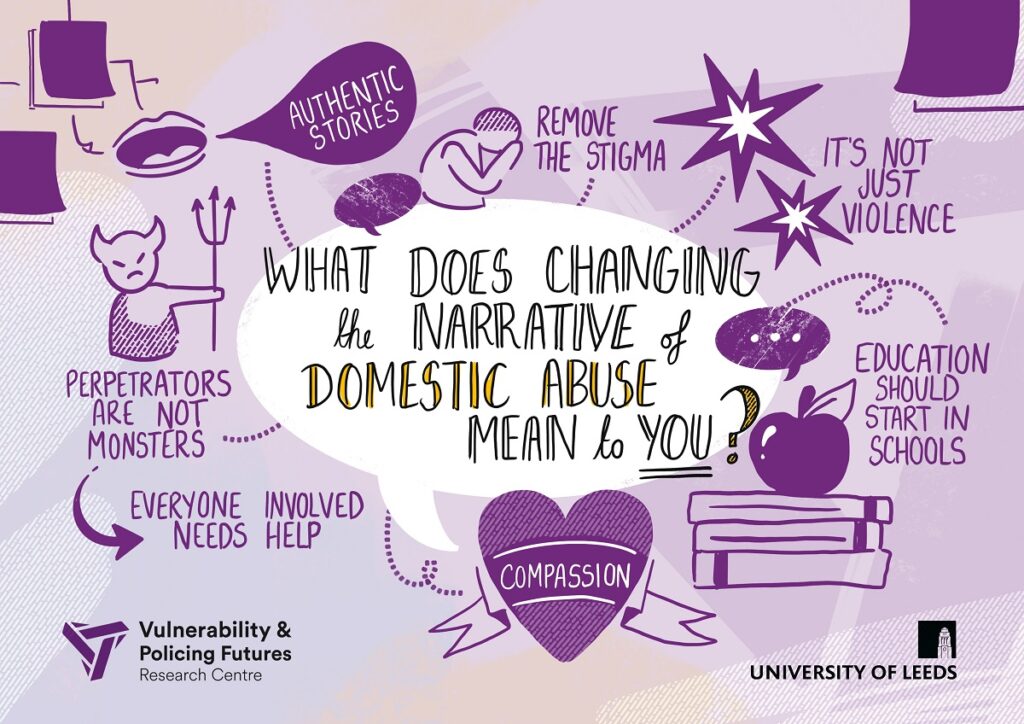This research project investigates the narratives of service providers who deal with victims and perpetrators of domestic abuse.

The project has been co-designed by Dr Rebecca Shaw (Principal Investigator) and four service providers from West Yorkshire. These organisations have articulated the need for understanding frontline workers’ perspectives in order to improve future policy and practice.
The study will work with service providers to identify biases and misperceptions in narratives of domestic abuse, for example, characterisations of victims and perpetrators and how these are communicated.
By using narrative methodology, the project team hope to better understand the stories of these front-line workers, and work in collaboration with partners to create solutions that might change the dominant narrative and shape how agencies can prevent future harm and vulnerability.
Despite the introduction of the Domestic Abuse Act in 2021, which aimed to raise awareness of domestic abuse and improve the effectiveness of the justice system, domestic abuse remains an inherently difficult problem to tackle.
Evidence from the Crime Survey for England and Wales in March 2020 showed that women aged 16-19 were significantly more likely to be victims of domestic abuse in the last year than women aged 25 and over. The 2022 Child of the North Report has also recommended that the UK government should reinvest in domestic abuse services. While these problems have been exacerbated by the Covid-19 pandemic, academic research on domestic abuse responses and service provision in the UK demonstrates this is a long-standing societal problem.
This research project aims to offer a new contribution to current research by adopting a narratological methodology that explores and scrutinises the stories of service providers, and how they relate to the dominant narrative on domestic abuse.
This project has three overarching aims:
- To use a new, ground-breaking application of narrative methodology for investigating service providers’ experiences with victims and perpetrators.
- To assess current practitioners’ perceptions of the dominant narratives of domestic abuse and identify what kinds of narratives persist in preventing change.
- To identify gaps in understanding how the system responds to the needs of both perpetrators and victims, and potential strategies for practical change of the narrative of domestic abuse.
Ultimately, the project aims to better understand and contribute to changing the dominant narratives around domestic abuse.
Narratives are incredibly important when it comes to harm and vulnerability. They can inspire and motivate harmful action; they are used to makes sense of harm and vulnerability; and they are used in the process of surviving harm. Narrative analysis is therefore an essential methodological tool. Adopting a narrative framework in the context of victims and perpetrators of domestic abuse can help inform critical scholarly debate and lead to new thinking in law and policy.
The project team will conduct a series of interviews with participants from each of the four partner organisations: a semi-structured group interview and an individual narrative interview. They will then use a thematic and structural narrative analysis to examine the narratives practices that play out among these stories. By doing this, they can see the effect of these stories on the characterisation of victims and perpetrators of domestic abuse; and assess frontline workers’ perspectives on the biases and misperceptions of domestic abuse.
Phase 1: Literature Review
The project will begin with a comprehensive literature review carried out with the project Research Officer. This will involve a search for academic, grey, journalistic and practice-based literature on narrative, domestic abuse and policy. The review will help inform the project’s methodology and further work.
Phase 2: Data Collection
The project team will conduct interviews to get first-hand insights into the lived experiences of frontline workers. This will allow the team to examine the narratives that dominate domestic abuse discourse and to obtain views about the system’s response to and prevention of domestic abuse. Each of the four service providers have agreed to provide six frontline workers as study participants, with a total number of 24 individual interviews to be carried out.
The fieldwork will be carried out in two stages. First, the Principal Investigator will conduct informal group meetings with the study participants from each service provider respectively. The second stage will involve conducting narrative interviews with each participant individually.
Phase 3: Data Analysis and Production of Final Outputs
Once all data has been gathered and processed, the team will create and implement an analytical strategy. The methodology will explore the themes and structures of these narratives, drawing on approaches from social sciences and linguistics, with equal focus placed on content and form. Transcripts will be sifted and sorted twice to facilitate these twin approaches. The thematic approach will focus on the content of the story. The second approach, a structural analysis, emphasises the form of a story, namely how a story is organised and its constituent parts.
Lead investigator
- Dr Rebecca Shaw (University of Leeds)
Research officer
- Dr Kelly Henderson (University of Leeds)
Workshop: Domestic Abuse Service Providers and their Stories
On Wednesday 6 March, Dr Rebecca Shaw led a workshop with stakeholders based on the project’s research findings.
View the visual minutes from the workshop:
Blogs
“Domestic Abuse Service Providers and their Stories” An ongoing ESRC funded project via the Vulnerability and Policing Futures Research Centre’s ECR Development Fund – May 2023-April 2024 – by Dr Rebecca Shaw, published on the Socio-Legal Studies Association Blog.
The Stories We Tell About Domestic Abuse, with DA Service Providers – by Dr Rebecca Shaw, published on the N8 Policing Research Partnership Blog.
Domestic Abuse Service Providers and their Stories – by Dr Rebecca Shaw, published on the British Society of Criminology Blog.





